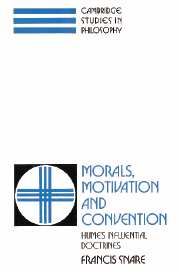Book contents
- Frontmatter
- Contents
- Acknowledgements
- NOTE
- Introduction
- Part I The argument for sentimentalism
- Part II The problems and consequences of sentimentalism
- 6 Continuity and circularity
- 7 The problem with justice
- 8 The conservative theory of justice
- 9 Convention and institutional facts
- 10 Convention and the regard to justice
- Bibliography
- Index
6 - Continuity and circularity
Published online by Cambridge University Press: 05 June 2012
- Frontmatter
- Contents
- Acknowledgements
- NOTE
- Introduction
- Part I The argument for sentimentalism
- Part II The problems and consequences of sentimentalism
- 6 Continuity and circularity
- 7 The problem with justice
- 8 The conservative theory of justice
- 9 Convention and institutional facts
- 10 Convention and the regard to justice
- Bibliography
- Index
Summary
The interesting thesis, for contemporary Humeans, in Part i of Book III of the Treatise is Hume's account of moral belief (broad sense), i.e., his sentimentalism, as some have called it. Hume's account has two parts. The basic, most argued for, part is a negative account of moral belief (III,i,l). It makes a claim about what moral judgments are not. They are not ‘deriv'd from reason’. I have argued that this negative claim is non-cognitivism (unless it is a highly subjectivist cognitivism). The positive thesis (III,i,2) is an account of what moral beliefs are. They are, or express, or centrally involve, the having of special sentiments (unless, perhaps, they are noninferential cognitive beliefs about one's having sentiments).
To have the sense of virtue, is nothing but to feel a satisfaction of a particular kind from the contemplation of a character. The very feeling constitutes our praise or admiration. We go no farther; nor do we enquire into the cause of the satisfaction. We do not infer a character to be virtuous, because it pleases: But in feeling that it pleases after such a particular manner, we in effect feel that it is virtuous. (471)
Sentimentalism is a meta-ethical thesis, at least in the broadest sense of ‘meta-ethical’, for it is a claim about the nature of moral judgments and not (obviously, at any rate) itself one of the substantive moral judgments it is about.
- Type
- Chapter
- Information
- Morals, Motivation, and ConventionHume's Influential Doctrines, pp. 147 - 175Publisher: Cambridge University PressPrint publication year: 1991



